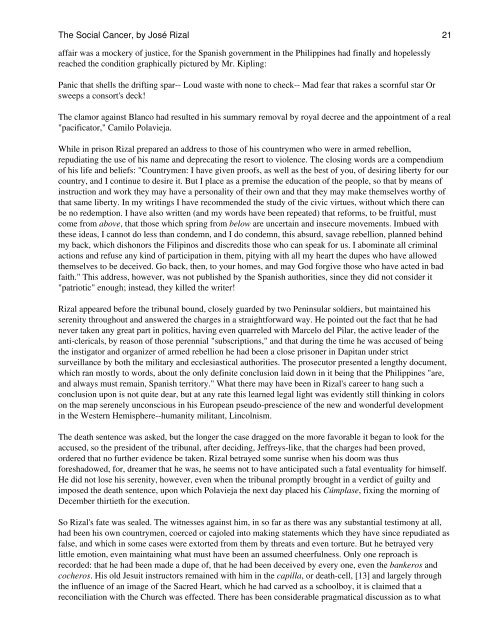The Social Cancer, by José Rizal - Home
The Social Cancer, by José Rizal - Home
The Social Cancer, by José Rizal - Home
You also want an ePaper? Increase the reach of your titles
YUMPU automatically turns print PDFs into web optimized ePapers that Google loves.
<strong>The</strong> <strong>Social</strong> <strong>Cancer</strong>, <strong>by</strong> <strong>José</strong> <strong>Rizal</strong> 21<br />
affair was a mockery of justice, for the Spanish government in the Philippines had finally and hopelessly<br />
reached the condition graphically pictured <strong>by</strong> Mr. Kipling:<br />
Panic that shells the drifting spar-- Loud waste with none to check-- Mad fear that rakes a scornful star Or<br />
sweeps a consort's deck!<br />
<strong>The</strong> clamor against Blanco had resulted in his summary removal <strong>by</strong> royal decree and the appointment of a real<br />
"pacificator," Camilo Polavieja.<br />
While in prison <strong>Rizal</strong> prepared an address to those of his countrymen who were in armed rebellion,<br />
repudiating the use of his name and deprecating the resort to violence. <strong>The</strong> closing words are a compendium<br />
of his life and beliefs: "Countrymen: I have given proofs, as well as the best of you, of desiring liberty for our<br />
country, and I continue to desire it. But I place as a premise the education of the people, so that <strong>by</strong> means of<br />
instruction and work they may have a personality of their own and that they may make themselves worthy of<br />
that same liberty. In my writings I have recommended the study of the civic virtues, without which there can<br />
be no redemption. I have also written (and my words have been repeated) that reforms, to be fruitful, must<br />
come from above, that those which spring from below are uncertain and insecure movements. Imbued with<br />
these ideas, I cannot do less than condemn, and I do condemn, this absurd, savage rebellion, planned behind<br />
my back, which dishonors the Filipinos and discredits those who can speak for us. I abominate all criminal<br />
actions and refuse any kind of participation in them, pitying with all my heart the dupes who have allowed<br />
themselves to be deceived. Go back, then, to your homes, and may God forgive those who have acted in bad<br />
faith." This address, however, was not published <strong>by</strong> the Spanish authorities, since they did not consider it<br />
"patriotic" enough; instead, they killed the writer!<br />
<strong>Rizal</strong> appeared before the tribunal bound, closely guarded <strong>by</strong> two Peninsular soldiers, but maintained his<br />
serenity throughout and answered the charges in a straightforward way. He pointed out the fact that he had<br />
never taken any great part in politics, having even quarreled with Marcelo del Pilar, the active leader of the<br />
anti-clericals, <strong>by</strong> reason of those perennial "subscriptions," and that during the time he was accused of being<br />
the instigator and organizer of armed rebellion he had been a close prisoner in Dapitan under strict<br />
surveillance <strong>by</strong> both the military and ecclesiastical authorities. <strong>The</strong> prosecutor presented a lengthy document,<br />
which ran mostly to words, about the only definite conclusion laid down in it being that the Philippines "are,<br />
and always must remain, Spanish territory." What there may have been in <strong>Rizal</strong>'s career to hang such a<br />
conclusion upon is not quite dear, but at any rate this learned legal light was evidently still thinking in colors<br />
on the map serenely unconscious in his European pseudo-prescience of the new and wonderful development<br />
in the Western Hemisphere--humanity militant, Lincolnism.<br />
<strong>The</strong> death sentence was asked, but the longer the case dragged on the more favorable it began to look for the<br />
accused, so the president of the tribunal, after deciding, Jeffreys-like, that the charges had been proved,<br />
ordered that no further evidence be taken. <strong>Rizal</strong> betrayed some sunrise when his doom was thus<br />
foreshadowed, for, dreamer that he was, he seems not to have anticipated such a fatal eventuality for himself.<br />
He did not lose his serenity, however, even when the tribunal promptly brought in a verdict of guilty and<br />
imposed the death sentence, upon which Polavieja the next day placed his Cúmplase, fixing the morning of<br />
December thirtieth for the execution.<br />
So <strong>Rizal</strong>'s fate was sealed. <strong>The</strong> witnesses against him, in so far as there was any substantial testimony at all,<br />
had been his own countrymen, coerced or cajoled into making statements which they have since repudiated as<br />
false, and which in some cases were extorted from them <strong>by</strong> threats and even torture. But he betrayed very<br />
little emotion, even maintaining what must have been an assumed cheerfulness. Only one reproach is<br />
recorded: that he had been made a dupe of, that he had been deceived <strong>by</strong> every one, even the bankeros and<br />
cocheros. His old Jesuit instructors remained with him in the capilla, or death-cell, [13] and largely through<br />
the influence of an image of the Sacred Heart, which he had carved as a schoolboy, it is claimed that a<br />
reconciliation with the Church was effected. <strong>The</strong>re has been considerable pragmatical discussion as to what


